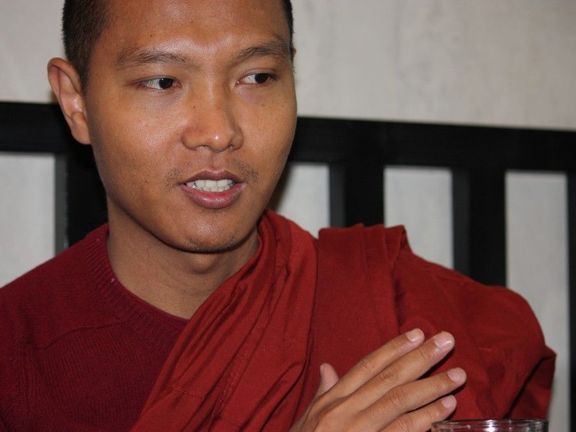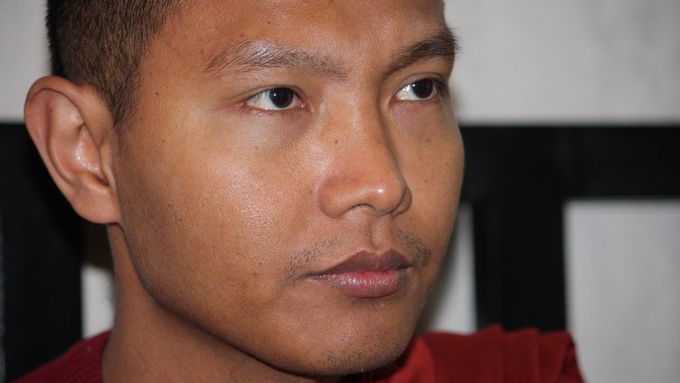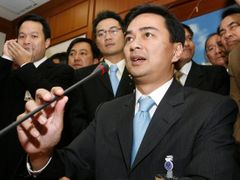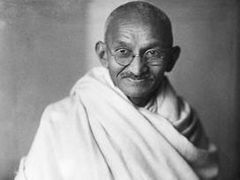Prague - One has to look further than to the inner clique of Burmese generals when trying to apportionate blame for the existence of what must be the longest ruling military regime in today's world.
Burmese monk Ashin Sopaka believes that the neighboring countries are only too happy to see the incompetent junta drive his motherland to the ground, and he does not hesitate for a second to call this behavior shameful.
The Burmese exile who recently came to Prague as a guest of the human rights film festival One World also has some harsh words for the United Nations and its secretary general, who, he believes, "should use his brain" when choosing his special envoys.
Much like in the first part of his extensive interview for Aktuálně.cz which we had published earlier, Ashin Sopaka strenghtens his arguments with personal experience and bits of the Buddhist teaching which provides for a refreshing look at the issues under debate.
Aktuálně.cz: You have been living in Germany for the last six years. But as many Burmese who flee their motherland you started your life of an exile in Thailand which hosts the biggest Burmese expatriate community. Just recently there have been some reports about alleged preparations for a crackdown against the exile groups on Thai-Burmese border. What do you make of this and what do you expect from the new(ish) Thai government led by Abhisit Vejjajiva when it comes to support for the Burmese pro-democracy movement?
Ashin Sopaka: We are still trying to find out what kind of person he really is. I had a lot of expectations from him since he is the Democratic Party leader and his predecessor (and former mentor) Chuan Leekpai was a big supporter of Burmese democratic movement. I thought he would follow in his footsteps but I am not so sure any more. Nevertheless, I do believe that we need fully democratic Thailand, because it is very important for the freedom of Burma as it may greatly help the cause we are espousing.
Sadly, it is not happening. If you were to count the number of Thai people who are actively involved in the fight for the restoration of democracy in Burma, you will find they are only a few, maybe a hundred. And Thailand is a big country, but the government is controlling the people, making them hate rather than help the Burmese, by bringing up the issue again and again of Burmese kings invading and destroying (the capital of Siamese kingdom) Ayutthaya in the 18th century. They are really playing with the people and it is a bad behavior, because history is history - those things are long gone and we should be thinking of how to live together.
Besides, it is also thoroughly anti-Buddhist to do this, because whenever they bring up these old animosities, they tell people to hate others, not to love them, which is really bad in a country that is predominantly Buddhist like we are.
And then there is the issue of cheap labour which the Thai government tries to exploit with many Burmese refugees working as slaves in Thailand, sometimes without any pay whatsoever.
So you think that it is actually in the economic interest of the Thai government to maintain the status quo in Burma?

Ashin Sopaka
- Born in 1977 in Sagaing Division in north-west Burma
- In 1989 he entered a monastery as a novice. Since then he has been following the regulations of the monastic Sangha (community of ordained Buddhist monks), strictly adhering to a set of rules
- In 2001 he left Burma, lived in Thailand, Singapore, Malaysia, Laos and Japan. In 2003 he settled in Germany, where he runs a Buddhist meditation center in Cologne
- He heads the German branch of the International Burmese Monks Organization (IBMO), which was founded in October 2007, following the bloody crackdown on thousands of monks during the Saffron revolution. The IBMO supports the work of monks and nuns inside Burma ands tries to alarm the international community about the human rights abuses under the military junta's rule.
- Between 2006-07 Ashin Sopaka organized world marches for peace in Europe, Asia and America.
- In Ferbuary 2008 awarded the International Freedom Prize by the Society of Liberty in Italy.
- In March 2009 invited by the One World festival to Prague
Yes. And I'm calling it slave labour, because I met one Burmese guy who was really treated like a slave and who managed to escape. First, a woman from a border town who worked with the Thai police persuaded him he could get a job in Bangkok. Then the police took him in a car to Chonburi where he was sold for eight thousand baht (around 220 USD) to his future employer. Imagine, they are selling people like animals there with many being sold for as little as 3,500 baht, which is something like one hundred USD. And it is still going on as we speak. When these slaves escape, the police go and catch them, then call the employer and charge him 5,000 baht for the "service". The owner then beats the slave and makes him work even harder because of the additional cost. They usually make them work as fishermen at sea, for two weeks at a time and when they return, the owner comes to collect them immediately at the beach and takes them straight to the slave house, built especially for the purpose of holding people with only breathing holes instead of proper windows. These places can hold as many as ten thousand people, mostly Burmese.
It is still happening there in the 21st century, it is hard to believe that. We have to free those people but they will only truly be free when their motherland is free, which is why I'm telling people that we have to free Burma soon otherwise people will suffer tremendously. We have to go on, because we don't have time.
When you say there is a need to have a fully democratic Thailand if Burma is ever to attain its freedom, what do you make of India's role in the region? The country is typically described as the biggest democracy in the world but when it comes to pursuing its economic interests, the government in New Delhi doesn't seem to be troubled a bit by the prospect of having to deal with the Burmese junta. Aren't you disappointed by the Indian approach?
Of course, more than disappointed. It is also shameful what they are doing because of Mahatma Gandhi. I wonder what this great leader and preacher of non-violence would say to the fact that the Indian government is selling weapons to the Burmese regime. There is a mutual interest - the generals are interested in buying more weapons from India while the Indians are interested in buying more natural gas from Burma. But it is shameful what the Indians are doing and insulting not only towards Gandhi but also towards Buddha and all people in India and elsewhere who love peace and freedom.
And it is not only India, but also China and Russia who are doing this. I met an ex-soldier from the Burmese army who told me he studied nuclear technology in Russia and there are many like him who go for military training to Russia. So these three countries, biggest in the world as far as the land area and the population is concerned, cooperate with the regime in Burma without caring about the regular people, without listening to the voice of the people.
Whenever China, Russia or India are selling their weapons to the Burmese junta, they are insulting our people and they are also complicit in murder, because these weapons are not meant for the protection of our borders but for the killing of the people who live within.
The UN, which should have forced them to the negotiating table long time ago, has unfortunately been corrupted by China and Russia who are sitting as permanent members on the Security Council, blocking all the resolutions. It even goes against the Buddhist teaching, because Buddha said that everything in the world is impermanent, so where do these permanent members come from? (laughter)
I have read some of your comments about the UN Secretary General's Special Advisor on Burma, Ibrahim Gambari, who has visited the country no less than seven times without securing any progress on the issues of releasing the political prisoners and promoting democratic reforms in Burma. Your words about him were not exactly flattering, to put it mildly…
A: Well, I really think that (the UN Secretary General) Ban Ki-moon made a mistake to appoint him as a negotiator. If he is so clever why he appointed this stupid guy who got into the UN apparatus as a servant of the former military regime in Nigeria? He (=Mr. Ban Ki-moon) must use his brain. And I am sure that Mr. Gambari clings to his post of the special envoy because of how power crazy he is, but he certainly does not seem to have any idea about how to solve the issue he has been tasked with.
You know, I had a very interesting dream just last week. Four people asked me: What would you like to do if you could meet Mr. Gambari? And I told them: I would like to kick him… out (laughter). It was just a dream, but a nice one (laughter).


